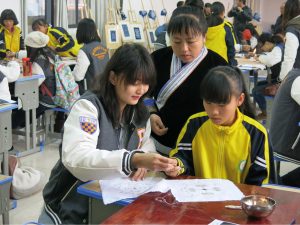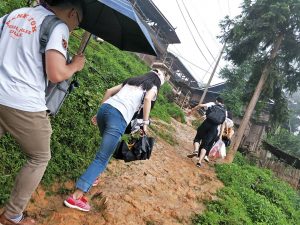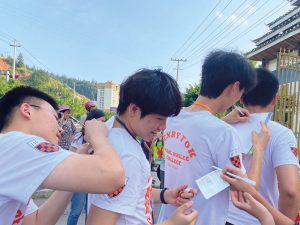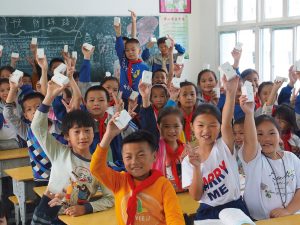On 28 May 2023, a train made its way from Guangzhou to Guizhou. On the train, a group of young people in bright orange T-shirts were talking to each other and taking notes. They were all service leaders from Henry Fok Pearl Jubilee College (HFPJC) of the University of Macau (UM), and were preparing for the volunteer teaching programme that would begin the following day in Congjiang county in Guizhou. Due to the COVID-19 pandemic, the programme had been suspended for a few years. Now the service leaders were eagerly anticipating a trip to the mountains to re-launch the programme.
‘Integrated’ Education Model and Service-Learning Programmes
Since its establishment in 2010, HFPJC has been committed to developing an ‘integrated’ education model that incorporates academic learning, hands-on practice, and community service into college activities. In this model, the college ensures that activities with different educational objectives can complement each other, and at the same time, provide a broad and seamless experiential learning network for students of different disciplines, interests, and hobbies. At the core of the ‘integrated’ education model lies service learning, which encourages students to serve the community by applying their academic knowledge in a practical context, and thus developing the ability of self-reflection and the concept of lifelong learning.
The college has launched service-learning programmes every year since 2014 to offer free education to underprivileged children in remote areas of mainland China. To date, nearly 200 HFPJC service leaders have travelled to Hainan, Guizhou, Jiangxi, Yunnan, Hunan, Guangxi and other provinces and regions to provide a variety of courses for more than 20,000 primary and secondary students in over 400 classes at 13 schools.
An Activity Network for Service-Learning Programmes
Each year, HFPJC organises a multitude of service-learning programmes in Macao and in remote, mountainous regions of mainland China. These initiatives allow students to contribute to the community while learning from and reflecting on their experiences. It is worth noting that such experiential learning opportunities not only occur when they are serving others, but also in programme planning and coordination.
In particular, the college organises an annual bazaar to raise funds for volunteer teaching programmes to be carried out in the mountainous regions in the mainland, and the students all take up different roles in the preparation process. Some attend workshops to learn basic techniques to design and develop products according to customer preferences. Some handle the donations by sorting, labelling, and displaying the products for sale. Some form a publicity and promotion team for designing posters, taking photos for advertisements, and creating product catalogues. And some join the sales team and take turns manning the booth and selling the products. In addition to charity bazaars, the college organises sharing sessions, talks, workshops related to volunteer teaching, and visits to partner organisations. It also publishes books on service learning, composes theme songs, makes promotional videos, and holds exhibitions to showcase student accomplishments.
The service-learning programmes aim to serve others and contribute to the community. They also empower students to develop seven competencies through a variety of activities. These include responsible citizenship (affection for home country and social responsibility), global competitiveness (global perspective and intercultural communication), knowledge integration (integration of academic knowledge and problem-solving skills), teamwork and collaboration (communication, coordination, and cooperation), service and leadership (cultivation and development of leadership skills), cultural engagement (multicultural experience and appreciation), and healthy lifestyle (healthy living and environmental protection). These competencies are integral to the ‘integrated’ education model and are incorporated into the service-learning programmes.
Extensive Collaboration Beyond UM
HFPJC’s first service-learning programme in mainland China was launched with Yanai Foundation, a non-profit organisation based in Hong Kong. Coordinated by the foundation, service leaders of the college visited Siyuan Schools in different parts of the country to help create a safe and healthy learning environment for left-behind children—children who remain in rural regions while their parents seek work in urban areas. The programme allowed students to visit mountainous regions in mainland China to witness the effectiveness of poverty alleviation policies, thereby fostering a sense of social responsibility and national identity.
To enrich the content of the volunteer teaching programmes, the college also teamed up with Clean the World Asia, a Hong Kong-based social enterprise, and Little Inventors, an international charity initiative. The collaboration with Clean the World Asia enabled HFPJC students to take part in a hotel soap recycling programme. The students then imparted the knowledge of hygiene and environmental protection that they learned from the programme to the children in the mountainous regions. Furthermore, the Little Inventors project, which brought new elements to the service-learning programmes, encouraged the students to be creative. Such experiences ultimately led them to design the well-received ‘Little Photographers’ and ‘Little Programmers’ projects for the volunteer teaching activities that followed.
Cultivating Leadership Among Students
Looking back, HFPJC has found that although nurturing leaders is not the primary objective of the service-learning programmes, they indeed foster a range of leadership qualities among students. These include confidence, communication skills, interpersonal and coordination skills, team spirit, and problem-solving skills. By integrating community service with civic education, the programmes strengthen students’ sense of social responsibility. In addition, the reflections and discussions during service-learning activities can prompt the process of relearning, enabling students to translate compassion into action and thereby develop leadership. Many students who took part in the volunteer teaching programmes in the mainland have later gone on to become active in the college’s House Association and other student organisations and have thus turned themselves into exemplary student leaders.
HFPJC students affectionately call themselves ‘juzi’ (‘orange’ in Chinese) or ‘laranja’ (‘orange’ in Portuguese). This is not only because the college has an adorable orange as its mascot, but also because they embrace the warmth, vitality, and love that the colour orange symbolises. The students aspire to share these attributes and lend others a helping hand. On their service-learning journey, students have brought rays of sunshine and love to underprivileged children in remote areas, and in turn, they have also experienced joy from their own learning and personal growth. If the fruit of love is service, then the fruit of service is holistic student development.
Author:
Dr Vivian Jiang is the associate master of Henry Fok Pearl Jubilee College at the University of Macau. She is responsible for overseeing the daily management, academic development, and community activities of the college. She holds a PhD in sociology from the Chinese University of Hong Kong and her research interests include residential college education, social research methods, and economic sociology. She has also authored a number of papers on residential college education and previously held an academic position at Shanghai Jiao Tong University.
Text / Vivian Jiang
Photo / Henry Fok Pearl Jubilee College
English Translation / Davis Ip
Source: UMagazine ISSUE 28

Students learned about the art of the Miao ethnic group’s wax dyeing technique alongside local children in Bijie municipality, Guizhou province in 2014.

Students visited local children’s homes in Congjiang county, Guizhou province in 2019.

Students wrote farewell messages to local children in Congjiang county, Guizhou province in 2019.

Children in Congjiang county, Guizhou province, demonstrated the use of eco-friendly soap donated by Clean the World Asia during a personal hygiene lesson in 2019.

Vivian Jiang
